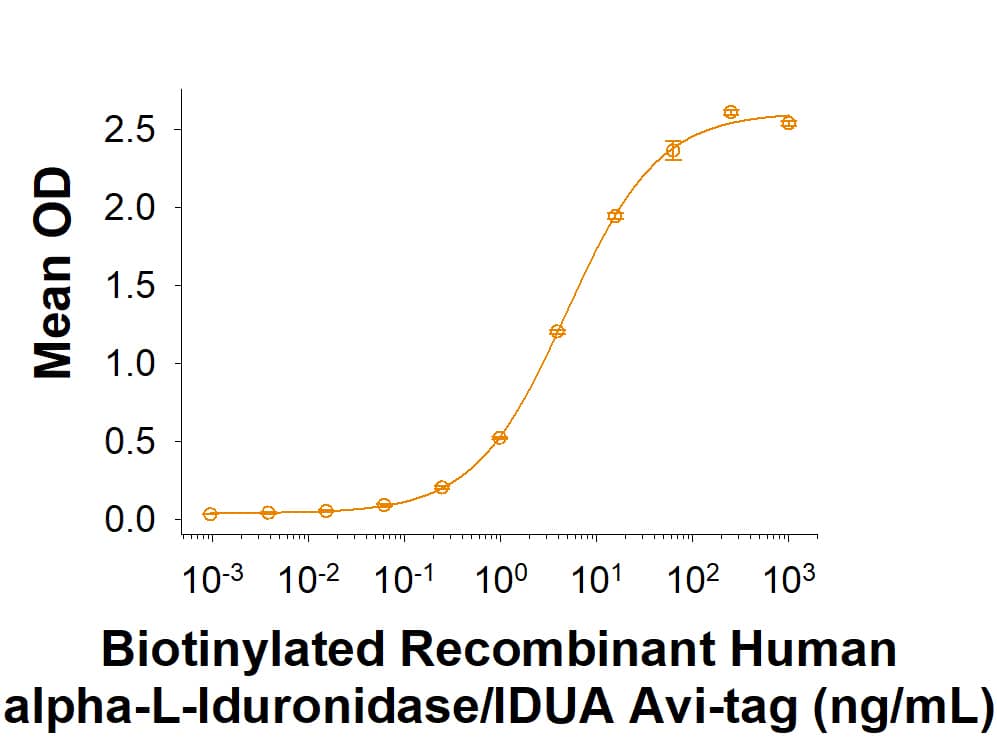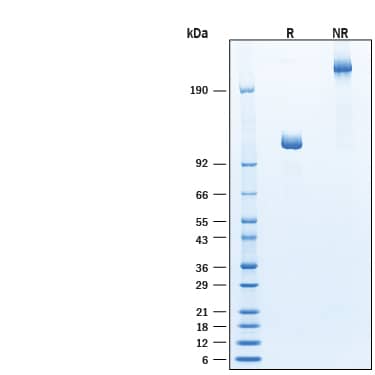Recombinant Human alpha-L-Iduronidase/IDUA Avi Protein, CF New
Recombinant Human alpha-L-Iduronidase/IDUA Avi Protein, CF Summary
Product Specifications
| Human IDUA (Ala26-Pro653) Accession # P35475.2 | Human IgG1 (Pro100-Lys330) | Avi-tag |
| N-terminus | C-terminus | |
Analysis
Product Datasheets
Carrier Free
CF stands for Carrier Free (CF). We typically add Bovine Serum Albumin (BSA) as a carrier protein to our recombinant proteins. Adding a carrier protein enhances protein stability, increases shelf-life, and allows the recombinant protein to be stored at a more dilute concentration. The carrier free version does not contain BSA.
In general, we advise purchasing the recombinant protein with BSA for use in cell or tissue culture, or as an ELISA standard. In contrast, the carrier free protein is recommended for applications, in which the presence of BSA could interfere.
AVI11613
| Formulation | Supplied as a 0.2 μm filtered solution in Sodium Acetate, NaCl and Glycerol. |
| Shipping | The product is shipped with polar packs. Upon receipt, store it immediately at the temperature recommended below. |
| Stability & Storage: | Use a manual defrost freezer and avoid repeated freeze-thaw cycles.
|
Scientific Data
 View Larger
View Larger
Measured by its binding ability in a functional ELISA. Recombinant Human alpha-L-Iduronidase/IDUA Fc Chimera Avi-tag Protein (Catalog # AVI11613) binds to Human alpha -L-Iduronidase/ IDUA Antibody (AF4119) with an ED50 of 2.00‑20.0 ng/mL.
 View Larger
View Larger
2 μg/lane of Biotinylated Recombinant Human alpha‑L‑Iduronidase/IDUA Fc Chimera Avi-tag Protein (Catalog # AVI11613) was resolved with SDS-PAGE under reducing (R) and non-reducing (NR) conditions and visualized by Coomassie® Blue staining, showing bands at 104-115 kDa and 210-230 kDa, respectively.
Reconstitution Calculator
Background: alpha-L-Iduronidase/IDUA
a-L-Iduronidase is a member of the glycoside hydrolase family encoded by the IDUA gene (1). It is an important enzyme required for the lysosomal degradation of glycosaminoglycans (GAGS) and hydrolyzes the non-reducing terminal a-L-iduronic acid residues in GAGS including dermatan sulfate and heparan sulfate. Human IDUA is a 653 aa protein composed of a signal peptide removed in the lysosome for mature form and three domains: a triosephosphate isomerase barrel fold containing the catalytic site, a B-sandwich domain, and an Ig(Ig)-like domain. The protein has six reported N-glycosylation sites and the glycosylation status of the enzyme correlates with its catalytic activity (1). More than a hundred disease-associated variants in the IDUA gene have been identified (1, 2). Mutations in IDUA that result in enzymatic deficiency lead to the autosomal recessive disease mucopolysaccharidosis type I (MPS I) (3). MPS I can be classified into three clinical subtypes; Hurler syndrome, Hurler-Scheie syndrome, and Scheie syndrome with decreasing severity, respectively. MPS I causes progressive cellular, tissue and organ damage, and several clinical studies using enzyme replacement therapy show positive results (4,5). More recently, the IDUA gene has been linked to osteoporosis (6, 7).
- Maita, N. et al. (2013) Proc. Natl. Acad. Sci. 110:14628.
- Borges, P. et al. (2021) Front. Mol. Biosci. 8:752797.
- Scott, H.S. et al. (1995) Hum. Mutat. 6:288.
- Wraith, J.E. (2005) Expert Opin. Pharmacother. 6:489.
- Jameson, E. (2016) Cochrane Database Syst. Rev. 4:CD009354.
- Kodric, K. et al. (2016) Wien Klin Wochenschr. 128:480.
- Niu, T. et al. (2016) J. Bone Miner. Res. 31:358.
FAQs
No product specific FAQs exist for this product, however you may
View all Proteins and Enzyme FAQsReviews for Recombinant Human alpha-L-Iduronidase/IDUA Avi Protein, CF
There are currently no reviews for this product. Be the first to review Recombinant Human alpha-L-Iduronidase/IDUA Avi Protein, CF and earn rewards!
Have you used Recombinant Human alpha-L-Iduronidase/IDUA Avi Protein, CF?
Submit a review and receive an Amazon gift card.
$25/€18/£15/$25CAN/¥75 Yuan/¥2500 Yen for a review with an image
$10/€7/£6/$10 CAD/¥70 Yuan/¥1110 Yen for a review without an image
